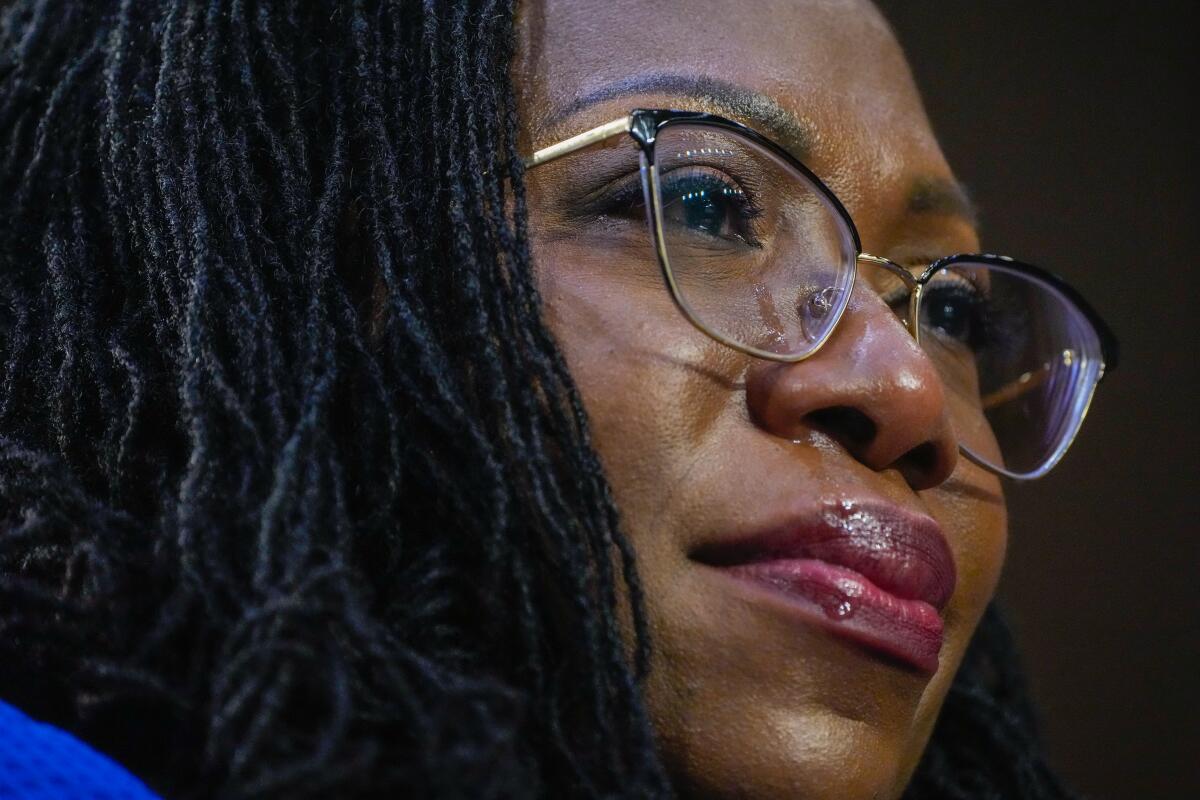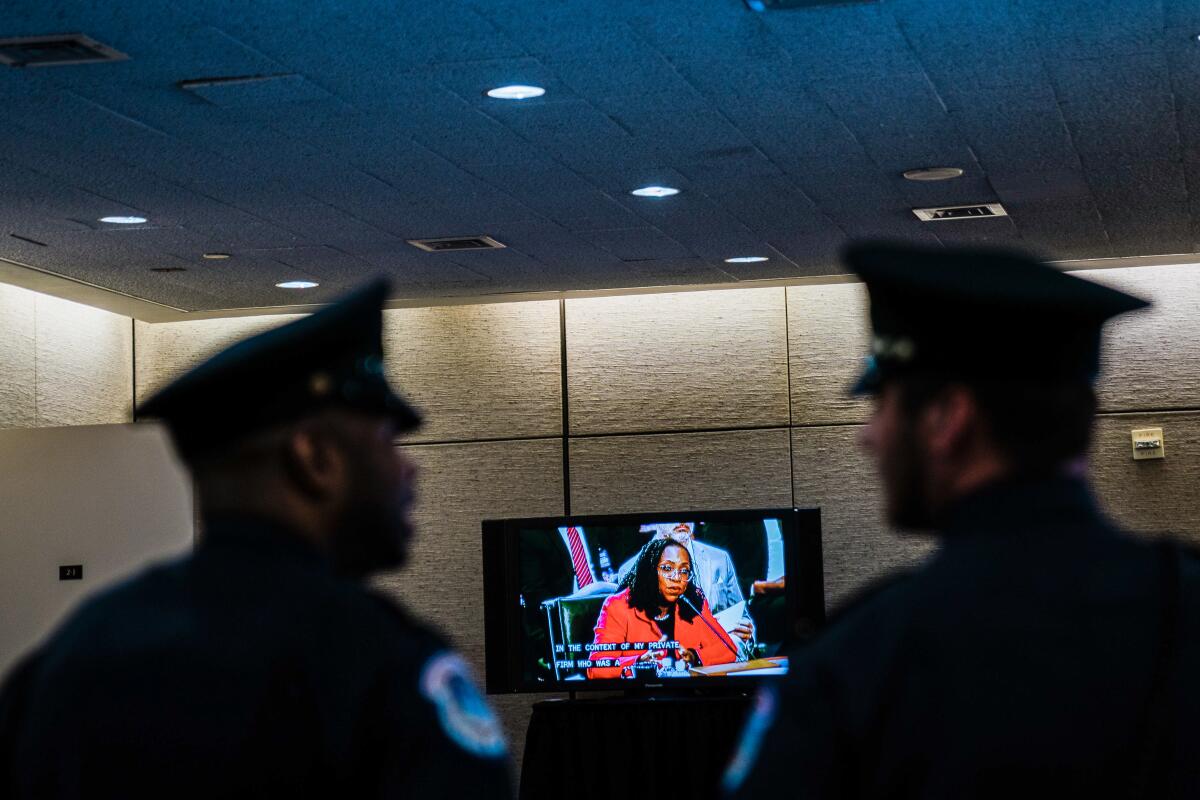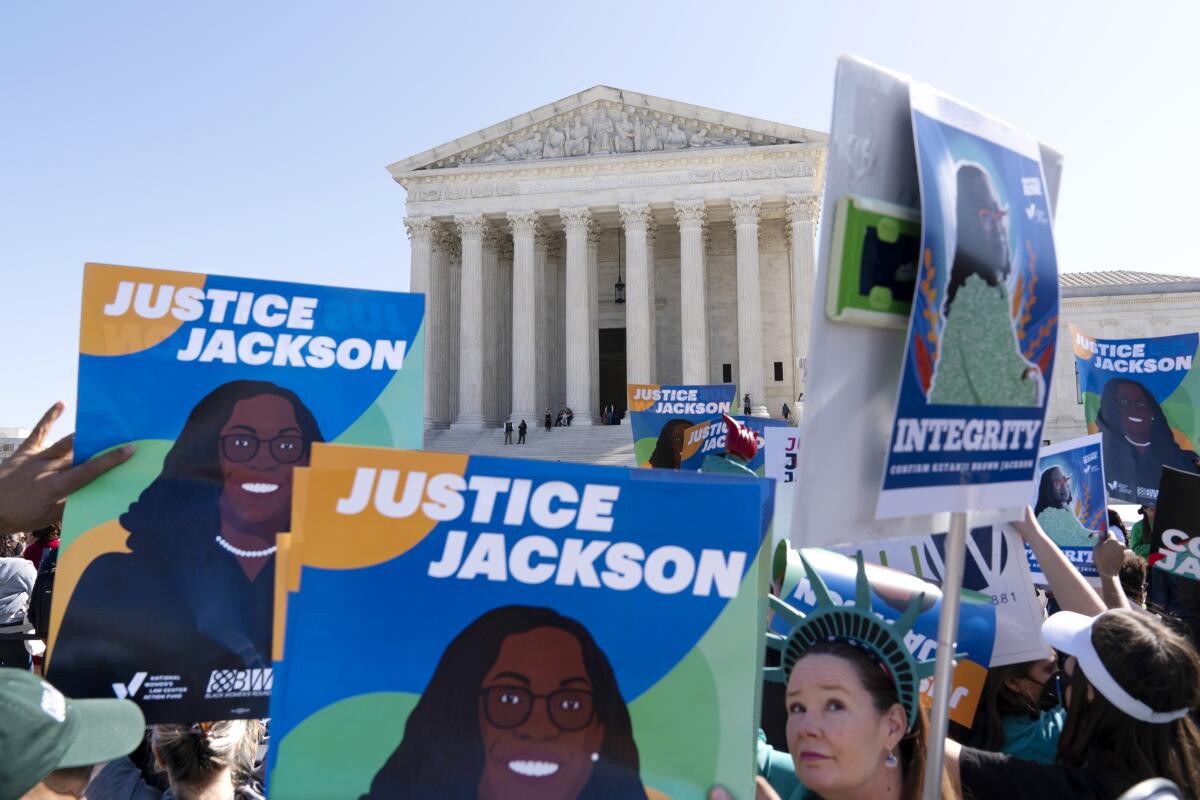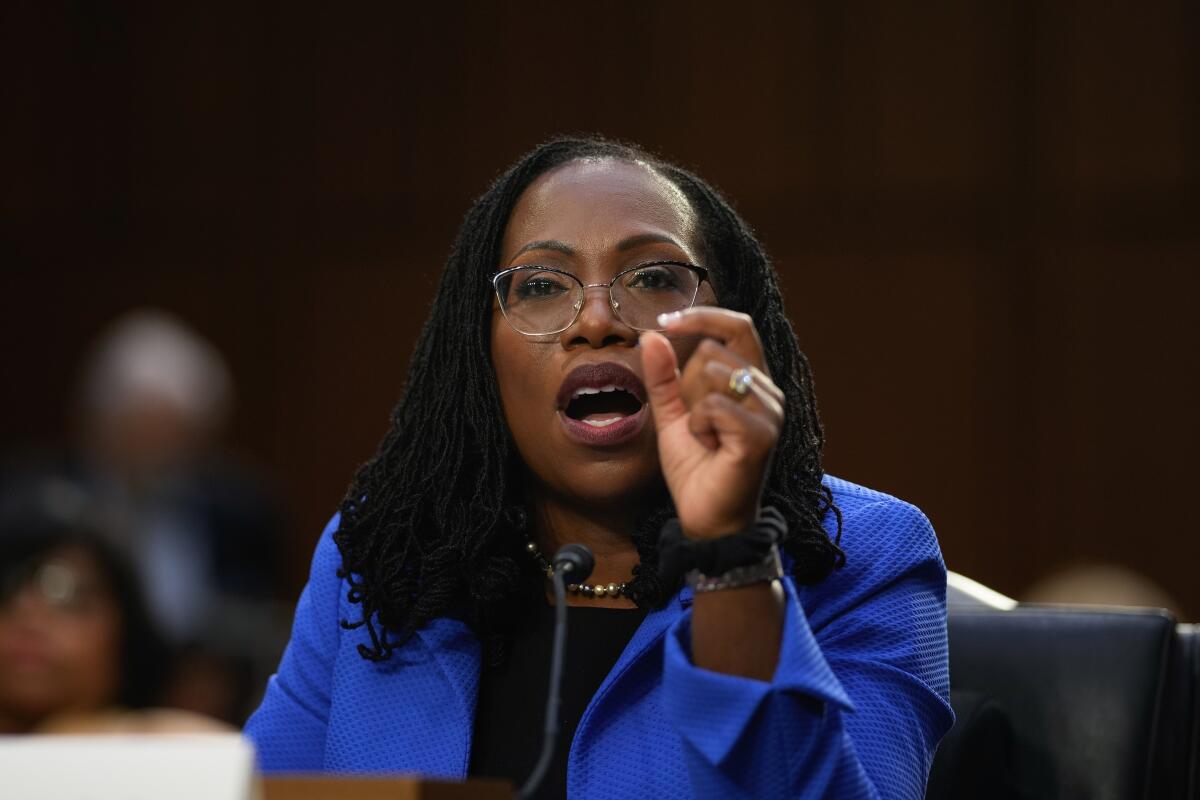Judge Ketanji Brown Jackson, President Biden’s Supreme Court nominee, returned for a second day of questioning today after hitting back against Republican claims that she was lenient toward criminal defendants, including those convicted of possessing child pornography, during a marathon session Tuesday.
Republicans aggressively questioned Jackson on the sentences she has handed down to sex offenders in her nine years as a federal judge, though they were largely in line with those of other federal judges. GOP senators also grilled her on her work as a lawyer representing terrorism suspects at Guantanamo Bay, her thoughts on critical race theory and even her religious views.
On Thursday, the committee will hear from legal experts before an eventual vote to move her nomination to the Senate floor.
Watch live: Ketanji Brown Jackson faces second round of questions

Jackson: ‘I hope to inspire people to try to follow this path’
California Sen. Alex Padilla (D) echoed praise for Judge Ketanji Brown Jackson, highlighting the double standards people of color in the United States often face.
“You’ve shown that you have the temperament to serve on the Supreme Court,” Padilla said. “People of color, particularly for those that have the audacity to try to be the first, often have to work twice as hard to get half the respect.”
Padilla asked Jackson to share a message for young people in the country, and she responded in a voice brimming with emotion.
“I hope to inspire people to try to follow this path, because I love this country, because I love the law, because I think it is important that we all invest in our future, and the young people are the future, and I want them to know that they can do and be anything,” Jackson said, wiping away a few tears. “I would tell them to persevere.”
Sen. Cory Booker says Jackson has shown she is worthy of being on the Supreme Court

Sen. Cory Booker (D-N.J.), the only Black senator on the Senate Judiciary Committee, gave Judge Ketanji Brown Jackson a break from the spotlight after the Supreme Court nominee had endured hours of questions from members of both parties.
Booker used his allotted speaking time to deliver an impassioned address that defended Jackson from Republicans’ criticism that she’s soft on crime, and told her she is worthy of becoming a Supreme Court justice.
He reiterated that Jackson comes from a family of law enforcement, including her uncles and brother, and was endorsed by the Fraternal Order of Police and the International Assn. of Chiefs of Police. He also questioned why Republicans hadn’t raised the issue of Jackson’s sentencing record in any of her previous hearings — she was confirmed by the Senate on three separate occasions — and warned Republicans that they were creating a dangerous standard in which Democrats would one day be able to paint a Republican nominee as soft on crime if he or she issued a sentence below recommendations on any occasion.
“Any one of us senators could yell as loud as we want that Venus can’t return a serve. We can yell as loud as we want that Beyonce can’t sing.” Booker said. “But you know what, they got nothing to prove.”
Booker detailed Jackson’s deep level of experience and highlighted her bipartisan confirmations.
“You got here like every Black woman in America who’s gotten anywhere has done,” Booker said, as Jackson grabbed a tissue and wiped around her right eye.
“You’re a person that is so much more than your race and gender,” Booker added. “You have earned this spot. You are worthy. You are a great American.
“The committee went on break after Booker spoke. Jackson’s parents approached Booker and gave him a hug. His Democratic colleagues and other guests in attendance also engaged with the New Jersey Democrat, seemingly to praise him for what he had said.
Jackson frustrated by GOP focus on ‘small subset’ of her sentences
Judge Ketanji Brown Jackson expressed “regret” Wednesday that Republicans on the Senate Judiciary Committee have spent so much time this week challenging her sentencing record in child pornography cases.
Sen. Josh Hawley (R-Mo.), who first raised the issue via Twitter late last week, has led Senate Republicans in questioning whether Jackson was too lenient in her sentencing of offenders in child porn cases.
On Wednesday, Hawley repeatedly asked Jackson if she regretted sentencing an 18-year-old defendant to three months.
“Senator, what I regret is that in a hearing about my qualifications to be a justice on the Supreme Court, we’ve spent a lot of time focusing on this small subset of my sentences.”
Hawley, however, continued to press Jackson about whether she regretted the sentencing.
“It sounds like the answer is no,” Hawley said. “But I want to tell you I regret it. I regret that you only gave him three months.”
Blumenthal urges Supreme Court to handle more cases
Sen. Richard Blumenthal (D-Conn.) said “the court needs to do its job,” pointing to the drop in the number of Supreme Court opinions over the years. He urged Judge Ketanji Brown Jackson to bring her energy to the court, referencing her record of issuing many opinions each year.
“The court is very much in need of it,” Blumenthal said.
Sasse warns against cameras in Supreme Court for arguments

Sen. Ben Sasse (R-Neb.) deployed a colorful term Wednesday to describe the conduct of some of his Senate colleagues as he made the case that transparency via cameras isn’t always a good thing.
Sasse said he agreed with Judge Ketanji Brown Jackson that the question of whether cameras should be allowed at Supreme Court proceedings should be left up to the justices.
“A huge part of why this institution doesn’t work well is because we have cameras everywhere,” Sasse said, notably during a high-profile televised hearing.
Cameras change human behavior, he said.
“There’s a whole bunch of things that humans can do if they’re not immediately mindful of some distant camera audience that they might be trying to create a sound bite for,” he continued. “And I think we should recognize that the jackassery we often see around here is partly because of people mugging for short-term camera opportunities.”
Jackson says she would recuse herself from Harvard affirmative action case
Judge Ketanji Brown Jackson told the Senate Judiciary Committee she intends to recuse herself from an affirmative action case against Harvard University, if she’s confirmed to the Supreme Court.
“Your and my alma mater, Harvard, is currently being sued for its explicit and, in my view, egregious policy of discriminating against Asian Americans,” Sen. Ted Cruz (R-Texas) said in his second round of questioning Wednesday, referring to allegations of discrimination in the university’s admissions process. “You’re on the board of overseers of Harvard. If you are confirmed, do you intend to recuse from this lawsuit?”
“That is my plan, Senator,” Jackson said.
‘Hard to watch:’ For Black women, Ketanji Brown Jackson hearing feels all too familiar

Georgetown government professor Nadia Brown tossed out the syllabus Tuesday for her “Race, gender and American politics” class, and spent the afternoon watching clips from Judge Ketanji Brown Jackson’s Senate confirmation hearing.
The session was a rare opportunity to showcase real-world events in the classroom. But it was also personal for Brown, one of several Black women around the country who have seen their experiences starkly reflected in the historic nomination.
“This is just a masterclass in how Black women have to be patient, have to be fully composed in responding to things that are meant for destruction,” said Brown, the chair of the university’s women and gender studies program. “These are the kinds of attacks that Black women get in their professional roles.”
58% of Americans support Jackson’s confirmation, poll finds

Judge Ketanji Brown Jackson has the support of 58% of Americans, according to a Gallup poll released Wednesday, the highest approval of any Supreme Court nominee since 2005, when Chief Justice John G. Roberts Jr. had 59% approval.
But the public is also sharply divided along partisan lines. While 88% of Democrats said they approved of President Biden’s choice for the high court and said she should be confirmed, only 31% of Republicans agreed.
President Trump’s nominees had somewhat less public support, Gallup said. Justice Amy Coney Barrett was supported by 51% at the time of her nomination in October of 2020, Justice Neil M. Gorsuch had the support of 45% in 2017 and Justice Brett M. Kavanaugh was supported by 41% in 2018.
Schumer praises Jackson’s ‘cool’

Senate Majority Leader Charles E. Schumer (D-N.Y.) hailed Judge Ketanji Brown Jackson’s performance Tuesday as a “master class.”
“Yesterday, Judge Ketanji Brown Jackson offered a 13-hour master class of why she deserves to be the 116th Justice of the United States Supreme Court,” Schumer said on the floor Wednesday morning. “She was simply impressive.”
Schumer described Jackson’s greatest strength as the “grace” and “poise” she displayed, “even during moments when a handful of Republicans asked intentionally misleading questions — questions which even their fellow Republicans found uncomfortable.”
Senate Republicans pressed Jackson on her judicial philosophy, sentencing in child pornography cases and other criminal cases, critical race theory and Supreme Court expansion, among other issues.
“Republicans tried to land a blow,” Schumer said, “but Judge Jackson kept her cool.”
He said he expects her to be confirmed to the high court by the Senate’s Easter recess next month.
McConnell calls Jackson ‘evasive and unclear’
Senate Minority Leader Mitch McConnell (R-Ky.) called Judge Ketanji Brown Jackson’s responses to Republican senators “evasive and unclear,” likely signaling that she won’t win many Republican votes.
“She’s declined to address critically important questions and ameliorate real concerns,” McConnell said on the Senate floor, citing court packing as an example.
Jackson told Sen. John Kennedy (R-La.) on Tuesday that she didn’t have a position on the issue of Supreme Court expansion, saying she understands the arguments of both sides and would be happy to serve as “one of however many” justices Congress thought was appropriate for the high court.
In McConnell’s telling, she “quietly” signaled openness to court-packing and left open a door that retiring Justice Stephen G. Breyer and the late Justice Ruth Bader Ginsburg “slammed” shut.
“I’m not sure Judge Jackson’s secret opinion on court-packing is as secret as she thinks it is,” McConnell said.
The GOP leader also criticized Jackson for her sentencing record on child pornography and drug cases, as well as her answers about her judicial philosophy.
“If Judge Jackson fully, truly feels she lacks sufficient experience with constitutional interpretation, then the Senate certainly should not confirm her,” he said. “But if she does not actually feel that way, then she owes the Senate much more candor about her approach.”
Democrats, however, don’t need any Republican votes to ultimately confirm Jackson to the Supreme Court.
Durbin warns against originalist approach to Constitution

Sen. Richard J. (D-Ill.) asked Judge Ketanji Brown Jackson how she would approach applying the Constitution’s centuries-old language “to the reality of the 21st century, and make sure it’s relevant.”
“When people pledge that they are originalist — ‘we’re sticking with the original words’ —you better have your mind open to the reality that this world is changing and changed,” he said.
Jackson stated that there are ways to apply the principles and foundational concepts offered in the Constitution to the modern day.
“The challenges that you identify are the types of the things that the Supreme Court is now dealing with,” she said. “The Supreme Court, and every court, deals with individual cases of disputes about issues. And when the court gets an issue that requires constitutional interpretation, it looks at the facts and circumstances of the particular case and the text and principles of the Constitution, in light of the times in which they were written, and analogizes to the present day.”
She pointed to cellphones and the court’s application of search and seizure laws to the modern technology.
Jackson pushes back at claims she was too lenient

Sen. Thom Tillis (R-N.C.) suggested that Judge Ketanji Brown Jackson was too lenient in freeing prisoners under compassionate release during the COVID-19 pandemic.
Jackson countered that she had been skeptical about releasing prisoners based on the health crisis.
“It would seem as though something like a deadly pandemic rampant in the jails would justify releasing everyone,” she said, adding that each case had to be considered on a case-by-case basis.
She also said: “Congress has indicated that we have to take each case individually. We have to look at the harm to the community that might be caused by the release of individual people. We can’t just release everybody, I said in that opinion.”
GOP senators complain about hearing process for Jackson

Republican senators opened Day 3 of Judge Ketanji Brown Jackson’s confirmation hearings singling out Sen. Richard J. Durbin (D-Ill.), the Senate Judiciary Committee chair, for what they argued was unfair editorializing after GOP senators finished questioning the judge.
“I noticed that after every serious questioning on this side of the aisle, you choose to editorialize and contradict the points being made by this side of the aisle,” Sen. John Cornyn (R-Texas) said, arguing that Republicans aren’t given an “equal opportunity to editorialize” after Democrats complete their questioning.
Sen. John Kennedy (R-La.) added that he’s had the same issue with Durbin in other committee hearings “where you make editorial comments after our question.”
“I appreciate your input, but they’re not offered in an evenhanded way,” Kennedy said. “And I just don’t think it’s productive.”
Democrats and Republicans alternate in their questioning of nominees based on seniority. Durbin, however, frequently spoke Tuesday after Republicans to refute, push back and add context to the issues GOP senators pressed Jackson on.
Durbin called it “chairman’s time,” which he said was a committee tradition that previous Republican chairs like Sens. Charles E. Grassley (R-Iowa) and Lindsey Graham (R-S.C.) also utilized during previous Supreme Court confirmations.
Sen. Jon Ossoff (D-Ga.), the first senator to ask questions Wednesday, asked the senators to table their discussion to continue with the hearing.
“I think the American public is now tuning in to these proceedings expecting a substantive discussion of matters of grave importance to the country with a nominee for the Supreme Court before us,” Ossoff said. “I don’t think we’ve set the appropriate tone by bickering over time and process at the outset of our proceedings.”
Congressional Black Caucus chair to testify at Jackson hearing
Rep. Joyce Beatty, chairwoman of the Congressional Black Caucus, will testify in the final day of Judge Ketanji Brown Jackson’s confirmation hearings, the Senate Judiciary Committee announced Wednesday.
As a member of the House, Beatty secured a rare private meeting with Jackson this month as she made the rounds with the senators who will vote on whether to elevate her to the Supreme Court next month.
Other witnesses include representatives from the American Bar Assn.’s Standing Committee on the Federal Judiciary and law, civil rights and law enforcement experts.
Some GOP senators focused their first day of questions on criminal sentencing
Judge Ketanji Brown Jackson weathered a 13-hour day before a Senate committee Tuesday, when she fended off charges by Republicans that she was too lenient in her sentencing of defendants.
She also navigated questions that she would be unlikely to play a large role in, such as how to teach children about racism in schools and the proper sentencing for child pornography possession. The Republican senators’ lines of questioning may have had less to do with defeating Jackson’s confirmation — which appears ensured — and more focused on November’s midterm election.
Brown remained calm and composed on Day 2 of her confirmation hearing, receiving praise from Democratic senators like New Jersey Sen. Cory Booker who applauded “her poise, her grace under fire.”
Jackson, 51, is a U.S. appeals judge for the District of Columbia. She previously served eight years as a federal district judge handling trials in Washington, and before that was a federal public defender. In addition to being only the third Black nominee to the Supreme Court, she would be the first justice to have worked as a public defender.
